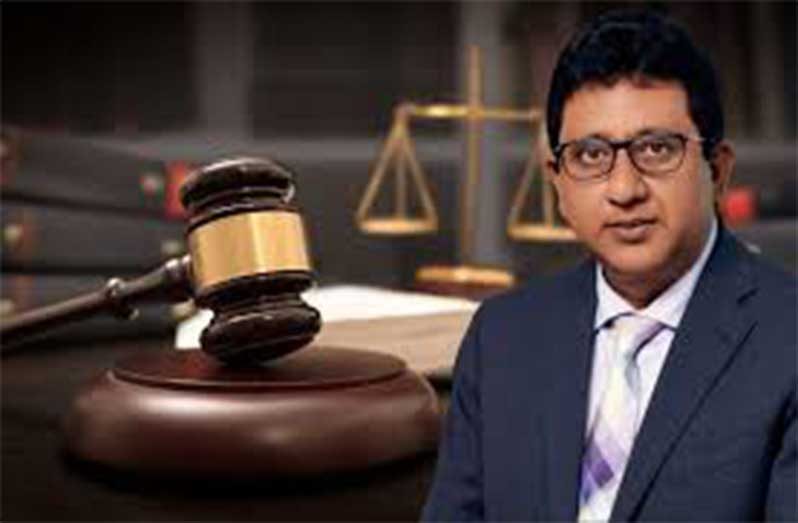— Confirms ruling has ‘no impact’ on extradition proceedings
LABELLING the judgement as an “aberration,” Attorney General and Minister of Legal Affairs, Anil Nandlall S.C., said the recent High Court ruling, which effectively bars the state from imposing post-clearance taxes, strips the state of its “sacrosanct” power to collect revenue and threatens the nation’s financial lifeblood.
The Attorney General made those remarks during a broadcast interview with the News Room on Saturday, in which he contended that the ruling handed down by High Court Judge, Gino Persaud, in the civil tax case of U.S.-indicted Azruddin Mohamed borders on irrationality.
Justice Persaud, on Friday, ruled in favour of Mohamed that the Guyana Revenue Authority (GRA) could not impose post-clearance taxes to the tune of $421 million on a Lamborghini and two other vehicles.
Nandlall defended GRA’s move to appeal the ruling. The state’s power to recover taxes owed and outstanding is vested in various pieces of legislation, including the Income Tax Act, Customs Act, Property Tax Act and Companies Act and according to the Attorney General, this ruling would render the state’s legal authority as ineffective.
“Taxes are the lifeblood of a nation. Taxes are what run a country, and that is why the state is invested with this huge repertoire of power to assess taxes, and the state is given exceptional ability, in law and by law, to do things that may look extraordinary, in order to recover taxes. That is the nature of taxation and the state’s power to recover taxes. What this judgement, in essence, has done is to render ineffective, to cripple the state’s power to recover taxes,” the Attorney General argued.
This judgement, according to Nandlall, has “nullified” GRA’s power, as he noted that it essentially means GRA would be permanently bound by a declaration made by a taxpayer once received, even if later the declaration has been proved fraudulent.
The Attorney General emphasised that every tax return or customs declaration includes mandatory legal forms, of which each taxpayer agrees to any potential reassessment.
Noting that GRA’s power is undeniable, Nandlall stated that post-clearance audits are an internationally-recognised mechanism and form part of the Kyoto Convention, which Guyana follows. He further noted that in 2017, the GRA established a special unit solely for post-clearance audits.
EVIDENCE OF FRAUD
Nandlall then pointed to the evidence of fraud as it pertained to the embattled businessman’s 2020 Lamborghini Roadster SVJ.
He said, “You had fraud being established, and fraud in law unravels everything. Once a taxing authority has evidence of fraud, there is no discretion anymore, but a duty crystallises on that taxing authority to go forward to get the right amount of taxes that should be paid. Recall that customs duties, for example, are ad valorem, meaning it is based upon value. The higher the value, the higher the taxes.”
In its statement, the GRA noted that Justice Persaud delivered his ruling on Friday at a time when the related criminal charges had already been withdrawn. As a result, the tax authority said the judgement is now “moot and now of academic importance only,” except for one critical issue that the court did not address.
According to the release, “the Honourable Court did not address itself to the issue of fraud regarding submissions supported with evidence made by the Revenue Authority.”
The GRA maintained that this omission leaves a substantive question unresolved, even though the broader matter may be considered academic following the withdrawal of criminal charges.
More significantly, GRA took issue with what it described as an “extraordinary pronouncement” by the court regarding the limits of the GRA’s statutory powers. According to GRA, the court “proceeded to make an extraordinary pronouncement to the effect that the Revenue Authority has no power to reassess taxes in the circumstances.”
The GRA firmly rejected that conclusion, stating that it is “of the respectful view that this latter pronouncement is wholly erroneous in law and not in line with the relevant provisions of the tax laws of Guyana.”
Nandlall is hopeful that the appeal by GRA will be filed quickly and that every effort will be made for a speedy determination.
EXTRADITION PROCEEDINGS
In light of the extradition request from the United States (U.S.) for Azruddin and his father, Nazar ‘Shell’ Mohamed, the Attorney General clarified that the recent High Court ruling does not affect the proceedings.
He said, “It has no impact whatsoever on the extradition proceedings. What would have had an impact on the extradition proceedings would have been the criminal proceedings in the magistrate’s court, which were duly withdrawn after careful consideration of the legal implications by the lawyers involved. So, there’s absolutely no connection.”
The U.S. government, on October 30, 2025, requested the extradition of the father and son under the extradition treaty between Guyana and the United Kingdom, which remains in force in Guyana under Section 4(1)(a) of the Fugitives Offender Act, Cap. 10:04, as amended by Act No. 10 of 2024.
The Mohameds are the subject of an unsealed indictment on October 6, 2025, by a U.S. Grand Jury in the Southern District of Florida, charging them with multiple offences, including wire fraud, mail fraud, money laundering, conspiracy, aiding and abetting, and customs-related violations linked to an alleged US$50 million gold export and tax evasion scheme.
The indictment alleges that between 2017 and June 2024, the accused conspired to defraud the Government of Guyana by evading export taxes and royalties on over 10,000 kilograms of gold, using falsified customs declarations and re-used export seals to disguise unpaid duties.
The indictment also references “the attempted shipment of US$5.3 million in undeclared gold seized at Miami International Airport, and the alleged under-invoicing of a luxury vehicle valued at over US$680,000.”
In June 2024, the U.S. Treasury Department’s Office of Foreign Assets Control (OFAC) sanctioned the Mohameds and Mohamed’s Enterprise for alleged tax evasion, trade-based money-laundering, and gold smuggling.
In March 2025, the Guyanese Government received a comprehensive dossier of evidence from U.S. authorities under mutual legal assistance arrangements. The documents reportedly contained evidence of falsified customs declarations, gold export irregularities and undeclared shipments seized in Miami.



.jpg)








